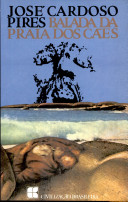 W
WBallad of Dog's Beach is a fiction novel by the Portuguese author José Cardoso Pires, relating the investigation into the murder of a political dissident, taking place around one month later by 1961. The novel is largely based on contemporary reports of a real murder that took place. The real story is the assassination in early 1961 of Army captain Almeida Santos by Jean Jacques, an Army m. d. They were both dissidents of the political regime who escaped from prison with the help of a prison guard. The three men took refuge in a house in Guincho Beach, twenty km outside Lisbon. They were joined by Maria José Maldonado Sequeira, a beautiful young woman who had an affair with A. Santos. While waiting for opportunity to leave the country, Maria José started a love affair with the two men, Santos e Jacques, which caused a fight between them and the death of Santos. Jacques buried him in the beach with the help of the guard. The body was discovered one month later by a dog whose owner was taking a walk.
 W
WThe City and the Mountains is a satirical novel comparing the emptiness of upper class life in Paris with the pleasures found in rural Portugal. It was written in 1895 by José Maria de Eça de Queirós, also known as Eça de Queiroz, when he was living in Paris. The novel was published posthumously in Portuguese in 1901 with a final edit and an ending contributed by his friend, Ramalho Ortigão. The first English version, translated by Roy Campbell, was published by the Ohio University Press in 1967. A new translation by Margaret Jull Costa, was published by Dedalus Books in 2008, and republished in 2018.
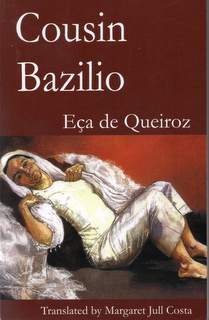 W
WO Primo Basílio is one of the most highly regarded realist novels of the Portuguese author José Maria de Eça de Queiroz, also known under the modernized spelling Eça de Queirós. He worked in the Portuguese consular service, stationed at 53 Grey Street, Newcastle upon Tyne, from late 1874 until April 1879. The novel was written during this productive period in his career, appearing in 1878.
 W
WO Crime do Padre Amaro, subtitled 'Scenes of Religious Life', is a novel by the 19th-century Portuguese writer José Maria de Eça de Queiroz. It was first published in 1875 to great controversy.
 W
WA God Strolling in the Cool of the Evening is a historical novel by the Portuguese writer Mario de Carvalho, set in the Roman province of Lusitania during the reign of Roman Emperor Commodus. First published in Portugal in Portuguese in 1994 as Um Deus Passeando Pela Brisa da Tarde, the novel won several awards, including the 1996 Pegasus Prize, and became a best-seller in Portugal.
 W
WThe Gospel According to Jesus Christ is a novel by the Portuguese author José Saramago. A fictional re-telling of Jesus Christ's life, depicting him as a flawed, humanised character with passions and doubts. The novel proved controversial, especially among the Roman Catholic Church, accusing Saramago of having a "substantially anti-religious vision". It was praised by other critics as a "deeply philosophical, provocative and compelling work".
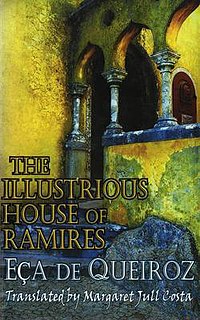 W
WThe Illustrious House of Ramires was the final novel written by the Portuguese writer José Maria de Eça de Queirós (1845-1900) and was published posthumously. A new English translation, by Margaret Jull Costa, was published in 2017, together with an Afterword by the translator. It has been described as a “satiric look at the existential state of Portuguese society on the brink of the modern age”.
 W
WThe Land at the End of the World is a novel by Portuguese author António Lobo Antunes first published in 1979. It reflects the personal experience of Lobo Antunes as an army doctor sent to Angola during the Portuguese Colonial War. Throughout the book, the reader assumes the position of "interlocutor" to the protagonist, who finds an Angola degraded by colonial conflict, the "unbelievable absurdity of war." The novel touches on several themes: the numberless casualties of war, disregard for the lives of the innocent, the protagonist's distance from home, his loss of family ties and fear of death, but above all the nightmarish conditions of colonial occupation and civil war.
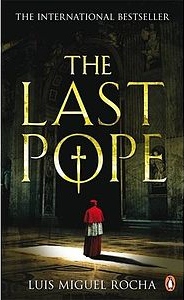 W
WThe Last Pope is a novel by Portuguese author Luís Miguel Rocha, released in 2006.
 W
WOs Maias: Episódios da Vida Romântica is a realist novel by Portuguese author José Maria de Eça de Queiroz, also known under the modernized spelling Eça de Queirós. Maia is the name of a fictional family, although some episodes fit into the history of the real Maia family.
 W
WThe Mandarin is a novella on the sin of avarice by José Maria de Eça de Queirós, also known as Eça de Queiroz. It was first published in Portuguese in 1880. The first English version, translated by Richard Franko Goldman, was published by The Bodley Head in 1965. A translation by Margaret Jull Costa, was published by Dedalus Books in 1993. A revised version was published by Dedalus in 2009, together with three short stories.
 W
WA Manhã do Mundo is a debut novel by the Portuguese writer Pedro Guilherme-Moreira.
 W
WThe Mystery of the Sintra Road is the first novel published by José Maria de Eça de Queirós, initially as a newspaper serialization in 1870 and subsequently as a book. It was co-written with Ramalho Ortigão. It is considered to be the first Portuguese detective story. An English translation by Margaret Jull Costa and Nick Phillips was published in 2013, and includes an Afterword by Phillips and the Preface to the Third Portuguese edition by the authors.
 W
WThe Relic is a novel written by the Portuguese writer José Maria de Eça de Queirós (1845-1900) and published in 1887. The most recent English translation, by Margaret Jull Costa, was first published in 1994, together with an Introduction by the translator.
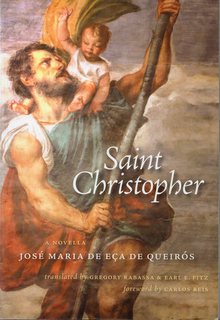 W
WSaint Christopher is a novella by José Maria de Eça de Queirós, also known as Eça de Queiroz, that draws on the legend of Saint Christopher. Written in the 1890s, it was first published posthumously in Portuguese in 1912. The first English version, translated by Gregory Rabassa and Earl E. Fritz, was published by Tagus Press in 2015.
 W
WTo the Capital (Portuguese: A Capital!) is a novel by José Maria de Eça de Queirós, also known as Eça de Queiroz. It was first published posthumously in Portuguese in 1925 following revisions to the text by Eça’s son. The first English version, translated by John Vetch, was published by Carcanet Press in 1997. The novel tells the story of a young man from the Portuguese provinces who dreams of literary fame in the capital, Lisbon, and his experiences in unsuccessfully trying to achieve that fame.
 W
WThe Tragedy of the Street of Flowers is a novel by José Maria de Eça de Queirós, also known as Eça de Queiroz. It was only first published in Portuguese in 1980. The first English version, translated by Margaret Jull Costa, was published by Dedalus Books in 2000, to coincide with the centenary of the author’s death.